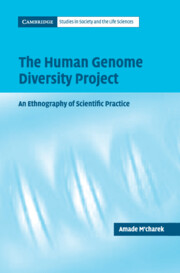Book contents
- Frontmatter
- Contents
- Preface
- 1 Introduction
- 2 Technologies of population: making differences and similarities between Turkish and Dutch males
- 3 Ten chimpanzees in a laboratory: how a human genetic marker may become a good genetic marker for typing chimpanzees
- 4 Naturalization of a reference sequence: Anderson or the mitochondrial Eve of modern genetics
- 5 The traffic in males and other stories on the enactment of the sexes in studies of genetic lineage
- 6 Technologies of similarities and differences, or how to do politics with DNA
- Glossary
- References
- Index
5 - The traffic in males and other stories on the enactment of the sexes in studies of genetic lineage
Published online by Cambridge University Press: 06 July 2010
- Frontmatter
- Contents
- Preface
- 1 Introduction
- 2 Technologies of population: making differences and similarities between Turkish and Dutch males
- 3 Ten chimpanzees in a laboratory: how a human genetic marker may become a good genetic marker for typing chimpanzees
- 4 Naturalization of a reference sequence: Anderson or the mitochondrial Eve of modern genetics
- 5 The traffic in males and other stories on the enactment of the sexes in studies of genetic lineage
- 6 Technologies of similarities and differences, or how to do politics with DNA
- Glossary
- References
- Index
Summary
Introducing the argument
What is genetic sex, and how is it enacted in studies of genetic lineage? These are the main questions put in this chapter. Genetic sex is hardly an issue in population studies interested in human histories. However, in the laboratories, one may find samples indicating male or female, and published papers contain accounts of women's migration history and that of men. This suggests that sex does matter. But where can it be located? It will be argued that, rather than a stated message in the DNA, in laboratory practices the sexes are performed as various things. However, this diversity tends to be subsumed and differences between the sexes tend to be essentialized. I will examine how that is done in the context of mitochondrial DNA (mtDNA) and Y-chromosomal research and show that this requires a specific treatment of DNA, namely as both a technology and a resourse for studying the history of populations.
Human geneticists know the sexes as XX and XY. Critics of this binary scheme, especially feminist scholars, have argued that to differentiate on the basis of XX and XY is to fail to pay any attention to culture. My aim in this chapter is to show that neither of these approaches takes into account the practices of genetics. Difference between the sexes is neither a natural quality embodied in individuals nor a cultural additive. Rather, it is an effect of interfering practices where the sexes are deemed relevant.
- Type
- Chapter
- Information
- The Human Genome Diversity ProjectAn Ethnography of Scientific Practice, pp. 120 - 147Publisher: Cambridge University PressPrint publication year: 2005
- 1
- Cited by



